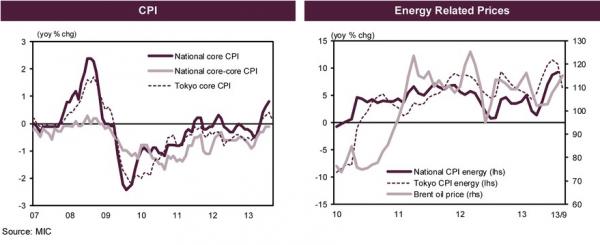While we have heard all the usual excuses that “Japan had no other choices” and that Abe simply had to slay the “deflation ogre” (it is still unclear why deflation is bad for the common man, if quite clear why it is disastrous for massively insolvent and overleveraged banks) the simple truth is that it was clear from the very beginning that Abenomics would be an abysmal failure. Ironically, in recent months the cheerleaders of Japan’s last ditch effort to delay the inevitable have gotten a second wind: “look at all the inflation” they say, and point to it as evidence that Abenomics is indeed working. There is a problem – it is inflation of all the wrong “non-core” items.
That inflation, it was also clear from the beginning, would surge. Read our take on just this from September:
… even the most absurdly clueless economist is silent this morning in their praise of Abenomics, which supposedly has succeeded in its one goal – bringing sexy inflation back. Why? Perhaps the reason is that whereas Keynesian inflation in which prices and wages are broadly if modestly rising as a result of a properly functioning monetary system, is indeed just what the Doctor of modern economics ordered, soaring input costs driven by FX differentials and current account flows, “offset” by plunging wages is precisely the opposite of what Abenomics was supposed to be. Which is exactly what is going on in Japan.
In other words, all that Abenomics’ cratering of the Yen has succeeded in doing is causing gas and energy prices, and to a lesser extent food, to surge, just as we warned would happen in February. And of course, to make a few US-based hedge funds investing in the Nikkei that much richer.
In other words, all Japan managed to do is import the bad “non-core” inflation, which has sent food and energy prices through the rood (confused why the rest of the world is suffering from an episode of acute deflation? look no further than deflation-exporting Japan) and made “non-core” purchases like food and gas increasingly more unaffordable to the ordinary Japanese consumer.


